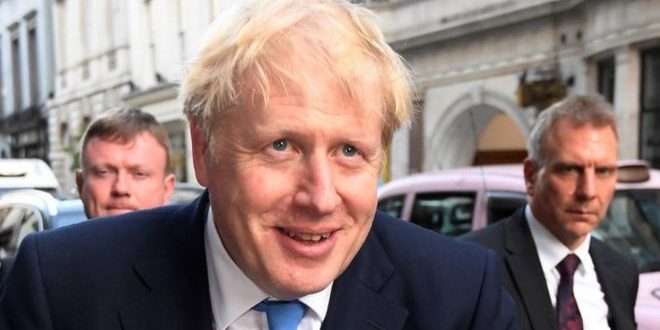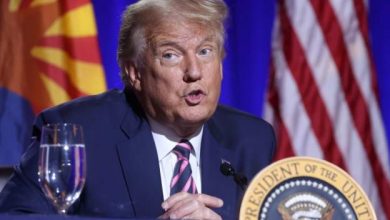International
Brexit: PM in new battle after Commons vote defeat

Boris Johnson faces a new battle in the Commons after his first vote as PM saw him lose to rebel Tories and opposition MPs who object to a no-deal Brexit.
The Commons voted 328 to 301 to take control of the agenda, allowing them to bring a bill requesting a Brexit delay.
The PM is to call for a general election if he is forced to request an extension to the 31 October deadline.
MPs will now vote on the Brexit delay bill. If it passes, the vote on whether to hold an election will follow.
But unless two thirds of MPs back the move for an election it cannot be called – which looks unlikely, given Labour’s opposition.
Wednesday in the Commons will also see Chancellor Sajid Javid outline the government’s spending plans, with the health service, education and the police expected to fare well.
Speaking late on Tuesday to a packed House of Commons, the prime minister said the MPs’ bill would “hand control” of Brexit negotiations to the EU and bring “more dither, more delay, more confusion”.
He told MPs he had no choice but to press ahead with efforts to call an October election, adding: “The people of this country will have to choose.”
The BBC understands the government wants to hold an election on 15 October, two days before a crucial EU summit in Brussels. This is a day later than the BBC was previously reporting.
Mr Johnson has tabled a motion in Parliament seeking approval for an “early general election” but has not specified a date.
Labour has said the bill taking the no-deal option completely “off the table” needs to be passed before his party would support the call for a general election.
Shadow Brexit Secretary Sir Keir Starmer told BBC Radio 4’s Today that Labour wanted a general election but “on its terms not Boris Johnson’s terms”.
He said the party did not “trust” the PM to hold the election before the Brexit deadline – as he has insisted he will – suggesting Downing Street had “lied” last month when it denied reports that it planned to suspend Parliament.
“We are not shy of a general election but we are not going to be trapped into abandoning control of Parliament or be taken in what Boris Johnson says because we don’t trust him.”
Under the Fixed Term Parliaments Act, a prime minister must have the backing of at least two-thirds of the UK’s 650 MPs before a general election can be called outside of the fixed five-year terms.
Downing Street said the 21 Tory MPs who rebelled in Tuesday’s vote would have the whip removed, effectively expelling them from the parliamentary party and meaning they could not stand as Conservative candidates in the election.
The rebels include several senior Conservatives including ex-chancellor Ken Clarke – a Commons veteran of nearly five decades – who said he did not recognise his party anymore.
“It’s the Brexit Party, rebadged,” he told BBC Two’s Newsnight programme.
The “knockabout character” of the prime minister had “the most right-wing cabinet a Conservative government has ever produced”, he said.
Also among the other jettisoned rebels are Philip Hammond who – until 24 July – served as chancellor, former justice secretary David Gauke, Winston Churchill’s grandson Sir Nicholas Soames, and Rory Stewart, who recently stood against Boris Johnson to be the party leader.
The former international development secretary told the Today programme he was sacked by text message, as he was being given the GQ magazine award for politician of the year.
“It was a pretty astonishing moment,” he said. “It feels a little bit like something you associate with other countries – one opposes the leader, one loses the leadership race, no longer in the cabinet and now apparently thrown out of the party and one’s seat too.”
Mr Stewart said the decision on who should be a Conservative candidate should rest with local associations, not be made centrally. “This is not a Conservative way of behaving,” he added.
Sir Nicholas said his decision to rebel was not taken “lightly”, but he felt strongly about avoiding a no deal.
He added: “The fact is I’m satisfied that [the prime minister] himself wants a deal, but the deal he wants is not available.”
Ruth Davidson, the outgoing leader of the Scottish Conservatives, criticised the decision to throw out dissident MPs, tweeting:
Brexit minister Kwasi Kwarteng said the loss of so many Tory MPs was a “shame but you cannot have people voting against their party”.
Hours before the vote on Tuesday, the government had already lost its working majority when Tory MP Phillip Lee defected to the Liberal Democrats.
Could the Commons defeat be a benefit to PM?
It’s hard to know where to start sometimes.
The pace and gravity of events in Westminster this week is both monumental and dizzying.
A prime minister has lost his wafer of a majority.
But some close to the prime minister believe that from this crisis comes an opportunity – to close the unfinished business of the referendum result in 2016, with the Tory party at last being the bearers of a crystal-clear message on Brexit.
It’s a measure of how upside down the political norms are – that the prime minister losing his first vote in office is considered by some of his allies as a benefit.
Source: Parliament



